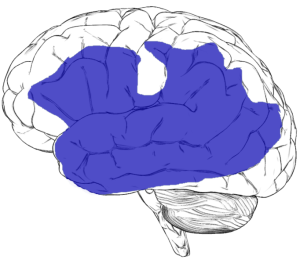Hearing in Complex Environments
70 Language Cortex
Learning Objectives
Know that aphasia is a loss of language skills due to cortical damage.
Be able to distinguish 3 primary kinds of aphasia: expressive, receptive, and conduction aphasia.
Distinguish functions of the Wernicke’s area and Broca’s area in speech perception and reading.
Aphasia is an inability to comprehend and formulate language because of damage to a specific brain region. The main causes of aphasia is a cerebral vascular accident (stroke) or any sort of head trauma. However aphasia can also be a result of brain tumors, brain infections, or a neurodegenerative disease. There are three primary kinds of aphasia, which include expressive, receptive, and conduction aphasia.
Expressive aphasia, also known as Broca’s aphasia, is characterized by the partial or full loss of the ability to produce language. This includes spoken, manual, or written language. Although expressive language can be extremely difficult, the ability to understand and comprehend language remains intact. Individuals with this type of aphasia usually will be able to read, however, since the ability to produce language is impaired, writing is usually limited because of the brain’s inability to produce language in the form of writing.
Receptive aphasia, also known as Wernicke’s aphasia, is characterized by difficulty understanding written and spoken language, although other intellectual abilities are completely fine. This type of aphasia also causes an individual’s speech to be difficult to understand. What this means is they can speak in correct grammatical and syntactical sentences, but it doesn’t make a lot of sense. Because Wernicke’s aphasia affects the brain’s ability to make sense of words, reading and writing are often severely impaired.
Conduction aphasia is characterized by impairment with repetition. These individuals are able to express themselves relatively well, with only some word-finding issues, but have extreme difficulty repeating phrases, especially when they increase in length and complexity. This type of aphasia is much more rare than the other two types listed above.

Supplemental Information:
- “Aphasia can also be the result of brain tumors, epilepsy, autoimmune neurological diseases,[4] brain infections, or neurodegenerative diseases (such as dementias)”
- “Broca’s area, or the Broca area is a region in the frontal lobe of the dominant hemisphere, usually the left, of the brain with functions linked to speech production.”
- “Wernicke’s area, also called Wernicke’s speech area. It is involved in the comprehension of written and spoken language, in contrast to Broca’s area, which is primarily involved in the production of language.”
- Figure:

Figure 7.12.2 Regions of the left hemisphere that can give rise to aphasia when damaged (schematic diagram based on findings of I. Henseler, F. Regenbrecht, H. Obrig, 2014). DOI: 10.1093/brain/awt374 (Credit: User Bertyhell on Wikicommons, License: CC BY-SA 3.0) - “For example, in the following passage, a patient with Broca’s aphasia is trying to explain how he came to the hospital for dental surgery:”
Yes… ah… Monday… er… Dad and Peter H… (his own name), and Dad…. er… hospital… and ah… Wednesday… Wednesday, nine o’clock… and oh… Thursday… ten o’clock, ah doctors… two… an’ doctors… and er… teeth… yah
- People have frequent errors during spontaneous speech, such as substituting or transposing sounds. They are also aware of their errors and will show significant difficulty correcting them.[3]
For example:
Clinician: Now, I want you to say some words after me. Say ‘boy’.
Aphasic: Boy.
Clinician: Home.
Aphasic: Home.
Clinician: Seventy-nine.
Aphasic: Ninety-seven. No … sevinty-sine … siventy-nice…
Clinician: Let’s try another one. Say ‘refrigerator’.
Aphasic: Frigilator … no? how about … frerigilator … no frigaliterlater … aahh! It’s all mixed up! [4]
CC LICENSED CONTENT, SHARED PREVIOUSLY
Wikipedia, Aphasia
URL: https://en.wikipedia.org/wiki/Aphasia
License: CC BY-SA 3.0
Adapted by: Abby Popp
CC LICENSED CONTENT, SHARED PREVIOUSLY
Wikipedia, Expressive Aphasia
URL: https://en.wikipedia.org/wiki/Expressive_aphasia#:~:text=Expressive%20aphasia%2C%20also%20known%20as,aphasia%20will%20exhibit%20effortful%20speech.
License: CC BY-SA 3.0
Adapted by: Abby Popp
CC LICENSED CONTENT, SHARED PREVIOUSLY
Wikipedia, Receptive Aphasia
URL: https://en.wikipedia.org/wiki/Receptive_aphasia
License: CC BY-SA 3.0
Adapted by: Abby Popp
CC LICENSED CONTENT, SHARED PREVIOUSLY
Wikipedia, Conduction Aphasia
URL: https://en.wikipedia.org/wiki/Conduction_aphasia
License: CC BY-SA 3.0
Adapted by: Abby Popp

